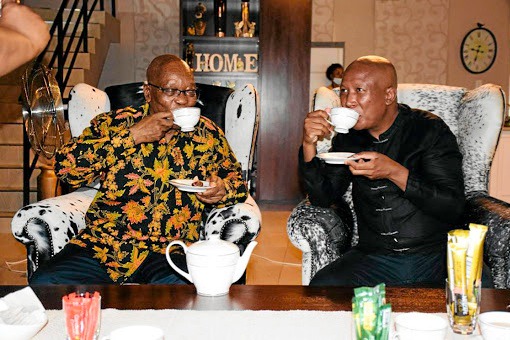Former President Jacob Zuma has reaffirmed his friendship with Economic Freedom Fighters (EFF) leader Julius Malema, despite ongoing tensions between the MK Party and the EFF over recent high-profile defections. Speaking to the Sunday Times, Zuma declared, “Julius Malema is my friend. I love him,” sparking widespread discussion across South Africa’s political landscape.
Zuma’s statement comes as relations between the two parties grow increasingly strained, with defections to the EFF raising concerns about loyalty and ideological shifts. While Zuma’s personal affection for Malema is evident, his remarks have done little to reconcile the broader political and strategic differences between their respective parties.
A Complex Political History
The relationship between Zuma and Malema is rooted in a shared history. Malema was once a vocal supporter of Zuma during his presidency but later became a fierce critic, leading to his departure from the ANC and the formation of the EFF. Despite their political divergence, Zuma’s latest comments reflect a camaraderie that appears to have endured years of political turbulence.
This dynamic illustrates an intriguing facet of South African politics, where personal relationships can persist despite ideological divisions. Zuma’s remarks highlight the human side of political life, where personal bonds are not always severed by party rivalries.
Divided Reactions
Public and political reactions to Zuma’s statement have been mixed. Supporters of the sentiment see it as a reminder that politics can retain a personal dimension, even amid ideological clashes. Others, however, view the comments as poorly timed and tone-deaf, given the growing animosity between the MK Party and the EFF.
The recent defections have only intensified scrutiny of Zuma’s declaration, with some questioning its impact on party unity. Critics argue that such sentiments could alienate MK Party supporters who view the EFF as a political rival rather than an ally.
Implications for South Africa’s Political Discourse
Zuma’s remarks underscore the complex interplay of personal ties and political rivalries in South Africa. As the MK Party and the EFF navigate the fallout from recent defections, the former president’s comments add an unexpected layer to the evolving narrative.
For now, Zuma’s public affirmation of his friendship with Malema serves as a reminder that politics is not solely about ideology but also about the relationships that shape its players. How this sentiment will influence the broader political landscape remains to be seen, but it is certain to fuel ongoing debates about loyalty, strategy, and personal connection in South African politics.






















